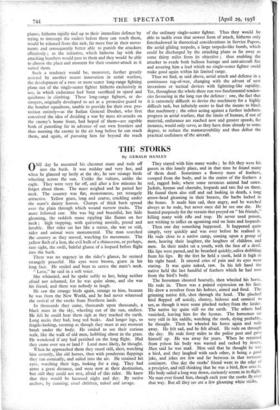THE STORKS
By GERALD HANLEY
ONE day he mounted his chestnut mare and rode off into the bush. It was midday and very hot, and when he glanced up lazily at the sky, he saw strange birds wheeling across the sun. Unlike the vulture, unlike the eagle. They were very far off, and after a few minutes he forgot about them. The mare neighed and he patted her neck. The country was flat, monotonous, yet strangely attractive. Yellow grass, long and coarse; crackling under the mare's dainty hooves. Clumps of thick bush spread over the plain through which wound narrow tracks. The mare followed one. She was big and beautiful, her hide gleaming, the reddish mane rippling like flames on her neck ; high stepping, with quivering nostrils, proud and lovable. Her rider sat her like a statue, she was so still, rider and animal were monumental. The man searched the country as they moved, watching for movement. The yellow flash of a lion, the evil bulk of a rhinoceros, of perhaps, rare sight, the swift, baleful glance of a leopard before flight into the bush.
There was no urgency in the rider's glance, he seemed strangely peaceful. His eyes were brown, grave in his long face. He smiled and bent to caress the mare's neck.
"Love," he said in a soft voice.
She whinnied, and he spoke softly to her, being neither afraid nor ashamed, for he was quite alone, and she was his friend, and there was nobody to laugh.
He saw the strange birds again, strange to him, because he was from the New World, and he had never witnessed the arrival of the storks from Northern lands.
In thousands they came, thousands upon thousands, a black mass in the sky, wheeling out of the sun, endless. He felt he could hear them sigh as they reached the earth. Long necks they had, long red beaks. And longer legs, so fragile-looking, seeming as though they must at any moment break under the body. He smiled to see their curious walk, like the walk of old men, hobbling about in the grass. He wondered if any had perished on the long flight. Had they come over sea or land ? Land most likely, he thought.
When he approached them they stood still, alert, watching him covertly, like old horses, then with ponderous flappings they ran comically, and sailed into the air. He strained his eyes, watching their legs, looking for a ring. They had come a great distance, and were now at their destination, but still they could not rest, afraid of this rider. He knew that they would be harassed night and day. By native archers, by cunning, cruel children, naked and savage. . They stayed with him many weeks ; he felt they were his guests in this lonely place, and in that time he found many of them dead. Sometimes a flowery mass of feathers, scooped from the body, and in the centre of the feathers a red, ragged hole, where some ravenous animal had eaten. Jackals, hyenas and cheetahs, leopards and rats fed on them. He found them also stiff and sad looking in death, a long arrow-head gleaming in their breasts, the barbs locked in the bones. It made him sad, then angry, and he watched always as he rode, but never once did he see one die. He hunted purposely for the vermin that preyed on " his friends," killing many with rifle and trap. He never used poison, not wishing to inflict an agonising end on lions and leopards. - Then one day something happened. It happened quite simply, very quickly and was over before he realised it. He rode dose to a native camp, coming upon a group of men, hearing their laughter, the laughter of children and men. In their midst sat a youth, with the face of a devil. His lips were parted, and he breathed quickly, saliva dribbling from his lips. By the feet he held a stork, held it -high in his right hand. It uttered cries of pain and its eyes were staring. • It was quite nakeds raw. In his left hand the native held the last handful of feathers which he bad torn from the bird's body.
The horseman shouted hoarsely, then wheeled his horse. He rode in There was a pained expression on his face. He drew a revolver from his holster, aimed and fired. The grinning native. fell,- shot. through the head: The plucked bird flopped off noisily, clumsy, hideous and comical to see, as though it were some plucked turkey from the larder. The native lay quite still on the earth. The others had vanished, leaving him for the hyenas. The horseman sat very still in his saddle, watching the stork, dying probably, he thought. Then he wheeled his horse again and rode away. He felt sad, and he felt afraid. He rode on through the day. He rode_ forty miles to the police post and gave himself up. He was away for years. When he returned from prison his body was wasted and racked by fevers. Men said he was mad. Men said that he thought he was a bird, and they laughed with each other, it being a good joke, and jokes are few and far between - in that tortuous continent. One day_ the storks' friend went to the edge of a precipice, and still thinking that he was a bird, flew over it. His body sailed a long :way down, curiously serene in its flight. No man ever found him, though each year the storks fly over that way. But.all_ they see are a few gleaming white sticks.


























































 Previous page
Previous page